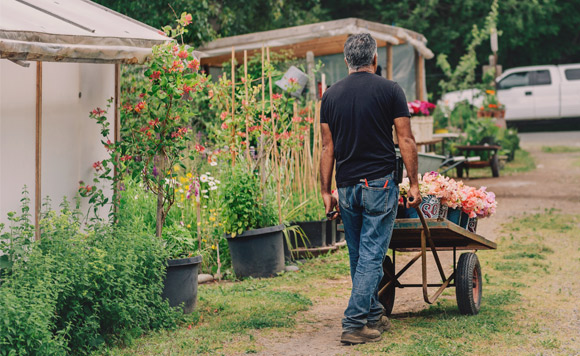by Jo Barnes –
“Busy as a bee.” “Hive of activity.” These phrases typically describe industriousness.
They also aptly describe one Saanichton farm which, as well as growing flowers, berries and veggies, features bees on site.
“Here, it is constant work that needs your attention,” shares Tirath Dheenshaw of Sol Farms. “I got into beekeeping 10 years ago. I love it.”
Raised on a farm, Tirath is well versed in both the degree of effort and amount of time that goes into tending the land. His farming education began early at the Gobind family farm on Veyaness Road.
“I was raised on a farm since I was about seven years old,” says Tirath. “At age nine I started driving a tractor with my dad. At age 14 I started driving vehicles.”
Tucked away amidst towering firs, cedar and cottonwood trees,
Sol Farms is eight acres of natural diversity, where plants grow and bear flowers, where berries burst forth and, yes, where bees buzz.
“They are very gentle. These bees are buckfast bees from Devon, England. Brother Adam, the man who developed them, went around the world and took the best characteristics of bees and bred them,” shares Tirath. “The honey they produce is floral and light.”
Echoing the farm’s name, life there is governed by our energy source: the sun. Activity flows according to the seasons from seeding to harvest to repair and renewal. Many of the plants grown here are those that thrive in the sunshine such as sunflowers, strawberries and sweet peas. It’s a dynamic setting, and yet tranquil at the same time.
“It is so peaceful here, absolutely peaceful,” comments Tirath. “You can get lost in your thoughts here. It’s great to see the good outcome of what you do and how it makes people happy.”
Initially in 1998 the farm produced strawberries, but after the successful introduction of sunflowers to the produce line, Tirath began to move the farm activity more towards flower production.
“With strawberries, it was hard to get pickers and to produce what we could sell,” shares Tirath. “Now we have four to five acres of sunflowers and just under a third of an acre of sweet peas.”
There is a regard for the land here. Renew, recycle, reuse are in the daily vocabulary.
“We recycle and do a lot of composting using greens, horse manure, kitchen waste, grass clippings, and any kind of plant waste,” says Tirath. “We use no pesticides; we have bees on site!”
This approach has brought new life and positive improvements to the property.
“When we were first on the farm there were hardly any worms in the soil,” he shares. “Now hundreds of worms are here, and we use the worm cast to enrich the soil.”
A variety of flowers are cultivated such as rose, iris, sweet william, delphinium, peony poppy, lavender and zinnia. Each one represents planning, seed care, careful handling and ongoing tending.
“We have two greenhouses here to grow seeds in – 95% of produce are grown from seeds,” states Tirath. “We put a lot of time into all.”
The flowers are arranged in bouquets. Pride is taken in product quality here. Freshness is first. “Our sunflowers last so long. They are picked the same day as delivery,” says Tirath. “We get 14 days or so out of some flowers.”
While strawberries continue to be grown, there are other berries in the lineup including the lesser-known josta berry. They’re bundled up in trays or baskets and also made into jars of jams and jellies.
“Our berries are grown the old-fashioned way. There’s no dripline or use of plastics. The plants go back into the ground, and we overhead water them,” comments Tirath.
Clients enjoy the fresh produce flavours and sweet aromas of the flowers year after year. Currently, produce is available on site at the farm stall and also through Peppers, Root Cellar and Red Barn Market in Oak Bay.
Non-invasive approaches, traditional methods and an ongoing love of the land; it’s an ideal mix for a good harvest as sweet as honey.
Photo by Janis Jean Photography




